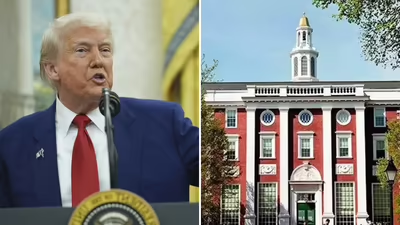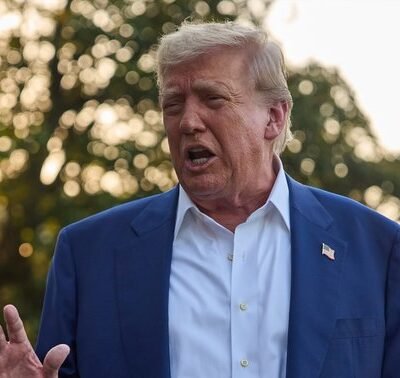In a major legal decision, a federal judge has blocked a controversial plan backed by former President Donald Trump that aimed to limit the ability of international students to attend Harvard University and other American institutions. This ruling comes as a relief to students, educators, and immigration advocates across the country and the world.
The plan, which was introduced during Trump’s presidency and revisited in recent months, proposed strict visa restrictions that would make it nearly impossible for many foreign students to study in the United States—especially at elite universities like Harvard. But the judge’s recent ruling sends a clear message: education should remain open to talent from around the world.
Why Was the Trump Plan So Controversial?
The Trump plan to block international students was seen by many as a direct attack on America’s global leadership in higher education. The core of the plan was to enforce tighter rules on student visas, including limiting their duration, requiring more frequent visa renewals, and placing stricter requirements for online classes—particularly during the COVID-19 pandemic.
Here’s why it sparked nationwide protests:
- Disruption to student lives: Students already enrolled at Harvard and other schools risked losing their legal status.
- Negative economic impact: International students contribute billions of dollars annually to the U.S. economy.
- Damaged global reputation: The move was seen as unwelcoming and politically motivated, harming America’s soft power abroad.
The Legal Fight: What the Judge Said
The ruling came from a federal district court in Massachusetts after Harvard University and the Massachusetts Institute of Technology (MIT) filed a lawsuit challenging the policy. In the decision, Judge Allison Burroughs called the rule “arbitrary and capricious,” emphasizing that it put unnecessary pressure on students and universities without any clear benefit to national security or public health.
Judge Burroughs said,
“The federal government cannot shift immigration policy based on political preferences without sound legal or scientific reasons. This plan would have closed the doors of American institutions to thousands of qualified and law-abiding students.”
Her ruling reinstates the previous policy, which allows international students to stay in the U.S. as long as they remain enrolled in their educational programs.
What This Means for International Students
For international students dreaming of studying at Harvard or similar institutions, this ruling is a major victory. Here’s what the decision ensures:
- Continuity in education: Students don’t have to worry about sudden deportations or having to leave mid-semester.
- Freedom to study online or in-person: Flexibility is preserved, especially during public health emergencies.
- Confidence in U.S. policies: Students and families abroad can once again trust that America values educational exchange.
Harvard President’s Response
Harvard President Claudine Gay issued a statement saying:
“This ruling is a reaffirmation of the values we hold dear. Education should not be limited by borders, and talent should not be denied a future due to politics.”
The Economic and Cultural Impact of International Students
Many people don’t realize just how important international students are to the U.S. economy and academic culture. According to the National Association of Foreign Student Advisers (NAFSA):
- In 2023, international students contributed over $40 billion to the U.S. economy.
- They supported more than 400,000 jobs in sectors ranging from education to housing.
- Many international students go on to become researchers, doctors, engineers, and entrepreneurs in the U.S.
Harvard, for example, has a long history of enrolling international students who later become global leaders. Blocking them would not only hurt the university, but also America’s future innovation and diplomacy.

Why Did Trump’s Team Push This Policy?
The Trump plan to block international students was part of a broader anti-immigration stance that defined much of his presidency. Supporters of the policy argued that:
- It would reduce visa fraud.
- It would protect American jobs.
- It would improve national security.
However, critics say there was little evidence to back these claims, especially when it came to student visas. Educational institutions have strict systems in place to verify students’ academic progress and compliance with visa rules.
Furthermore, most student visa holders are not seeking permanent residency. Instead, they come to the U.S. for a limited period to gain knowledge and return home—or contribute to the U.S. economy legally.
Reactions from the Public and Policy Experts
The response to the judge’s ruling has been overwhelmingly positive from education leaders, student groups, and immigration experts.
Dr. Angela Martinez, an immigration policy analyst, said:
“This is a win for common sense. International students bring in talent, cultural diversity, and economic growth. Closing the door on them was always a bad idea.”
Student groups, including the Harvard International Student Association, held a rally in Harvard Yard to celebrate the decision. Many carried signs saying “Education Has No Borders” and “Students Are Not Pawns.”
On social media, hashtags like #StudentsNotStrangers and #JudgeForJustice trended for hours after the ruling.
What’s Next? Could the Policy Return?
While this decision has blocked the policy for now, it may not be the end of the debate. If Trump or a similar political figure regains power, they could attempt to revive similar immigration restrictions.
However, the legal precedent set by this ruling makes it harder for any future administration to implement such changes without strong legal justification.
Legal scholars believe the ruling is a step toward protecting educational freedom and may influence other immigration-related lawsuits in the future.
Key Takeaways
Here’s a quick summary of what you should know:
- A federal judge has blocked Trump’s plan to restrict international students at Harvard and other U.S. schools.
- The court ruled the policy was “arbitrary” and “legally unsound.”
- The decision preserves flexibility for students to study in-person or online.
- It protects billions of dollars in economic contributions and supports America’s global leadership in education.
- The ruling may serve as a legal shield against similar future efforts.
Why This Matters Beyond Harvard
Although Harvard was at the center of the legal case, the impact goes far beyond the university’s walls. Other schools like Yale, Stanford, and public universities in Texas, California, and New York all stood to lose if the Trump policy had taken effect.
The real issue wasn’t just about one school—it was about whether the U.S. remains a welcoming place for global talent.
America has long been a magnet for ambitious students from across the world. From Nobel Prize winners to tech founders, many began their journey at U.S. colleges. Closing the door to them would mean closing the door to progress.
Final Thoughts
The federal judge’s decision to block the Trump plan to block international students is more than just a legal victory. It’s a reaffirmation of America’s commitment to education, openness, and global cooperation.
As one international student from Nigeria studying at Harvard said:
“I came here to learn, not to be part of a political battle. This ruling means I can focus on my studies—and my future.”
For now, the doors of Harvard and of opportunity remain open.
Read Next – Liberal Arts and Science Academy: A Top Public High School in Texas





